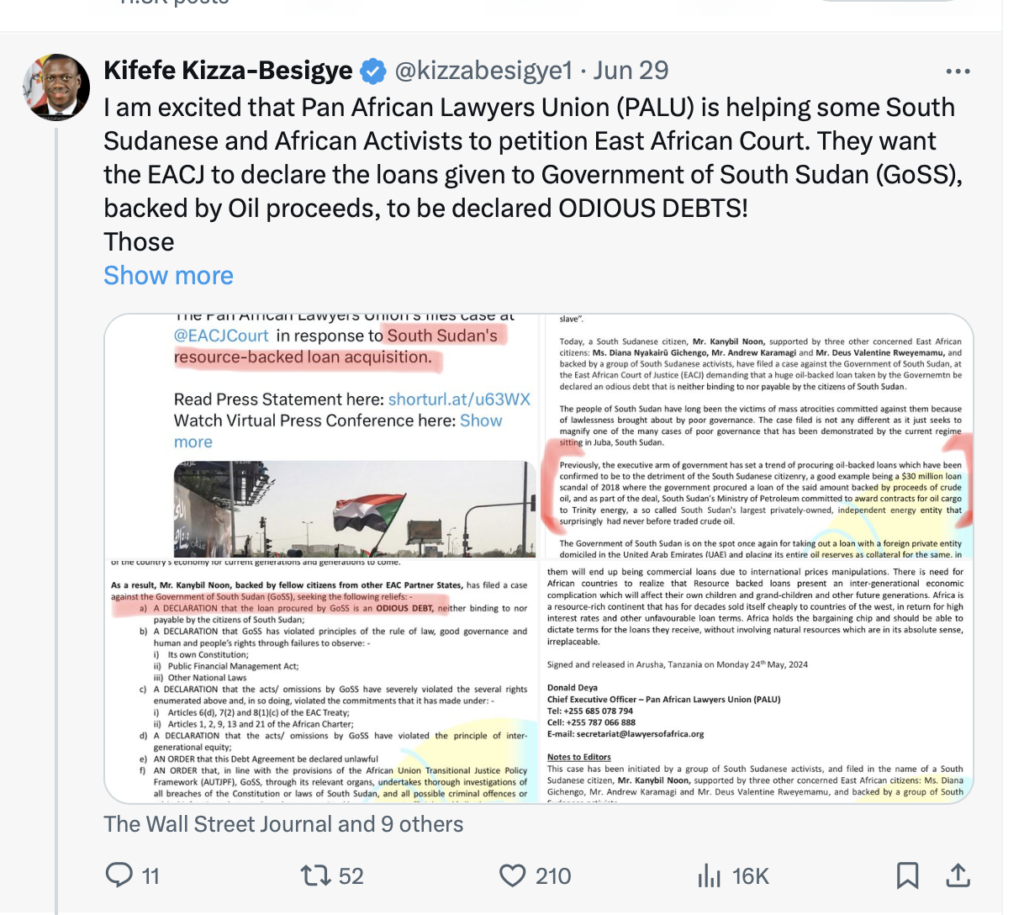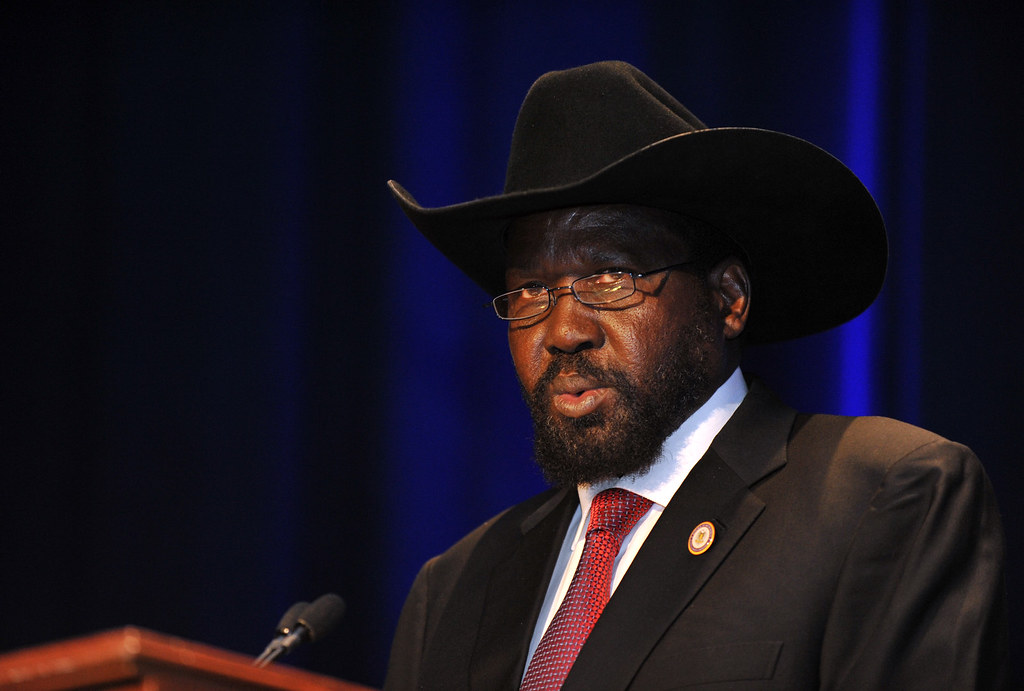Salva Kiir Mayardit, president of the Republic of South Sudan, addresses a large crowd at the International Engagement Conference for South Sudan on Dec. 14, 2011, in Washington, D.C. Photo copyright Kendra Helmer/USAID.
A South Sudanese lawyer joined by regional advocates filed a case against the government of South Sudan in the regional court over the distressful oil deal signed with a fake UAE oil company worth €12 billion.
The terms of the deal hand over South Sudan’s oil industry to the UAE company for 20 years in exchange for €12bn, an amount the government urgently needs to address the sinking economy and worsening cost of living in the country.
South Sudan is over 90 per cent dependent on oil sales to finance its governing system and payment of the salaries of its civil servants. It is almost clocking to one year the civil servants have not been paid their salaries and wages.
The lawyers vowed to challenge the Government’s Oil-Backed Loan at the East African Court of Justice, a fight they said “Against Odious Debt and Poor Governance.”
Mr. Kanybil Noon, supported by three other concerned East African citizens: Ms. Diana Nyakairū Gichengo, Mr. Andrew Karamagi, and Mr. Deus Valentine Rweyemamu, and backed by a group of South Sudanese activists, filed the case at the East African Court of Justice (EACJ) demanding that a huge oil-backed loan taken by the government be declared an odious debt that is neither binding to nor payable by the citizens of South Sudan.
“The people of South Sudan have long been the victims of mass atrocities committed against them because of lawlessness brought about by poor governance. The case filed is not any different as it just seeks to magnify one of the many cases of poor governance that has been demonstrated by the current regime sitting in Juba, South Sudan,” the lawyers said in a statement extended to Golden Times.
In a comment shared on X (Twitter), Uganda’s leading politician, Kifefe Kizza-Besigye commended the lawyers for their courage, saying “I am excited that Pan African Lawyers Union (PALU) is helping South Sudanese and African Activists to petition East African Court. They want the EACJ to declare the loans given to the Government of South Sudan backed by oil proceeds, to be declared ODIOUS DEBT!”

A preliminary oil contract signed by South Sudan with an obscure company based in the United Arab Emirates raises concerns about potential fraud. Behind this entity lies a man suspected to be implicated in international financial crimes.
On paper, it is one of the largest oil deals recorded in Africa during the last few years. At the end of 2023, South Sudan signed a preliminary contract with a small Dubai-based company called HBK DOP for a €12bn loan to be repaid in oil.
The deal effectively gives the company a 20-year cut-price monopoly on all South Sudan’s oil, a commodity that accounts for 90 per cent of the country’s revenue.
Behind this set-up is a man who represents himself as a relative of UAE President Mohammed bin Zayed al-Nahyan (aka MbZ) even if the extent of his royal connection is just that his great-grandfather was a distant cousin to the federation’s founder Zayed Ben Sultan al-Nahyan.
He is not actually a member of the ruling Zayed dynasty but comes from the Nahyan clan, who are very distant cousins. Moreover, none of his immediate family hold any official positions in the UAE government.
Previously, the executive arm of the government set a trend of procuring oil-backed loans which have been confirmed to be to the detriment of the South Sudanese citizenry,” the lawyers stated.
“A good example is a $30 million loan scandal in 2018 where the government procured a loan of the said amount backed by proceeds of crude oil, and as part of the deal, South Sudan’s Ministry of Petroleum committed to award contracts for oil cargo to Trinity energy, a so-called South Sudan’s largest privately-owned, independent energy entity that surprisingly had never before traded crude oil.”
The Government of South Sudan is on the spot once again for taking out a loan with a foreign private entity domiciled in the United Arab Emirates (UAE) and placing its entire oil reserves as collateral for the same, in an arrangement that will see the oil reserves and oil revenue of South Sudan tied up for up to 20 years.
The UNSC Panel opined that while the agreed interest rate in this particular agreement is lower than many of the Respondent’s existing commercial loans, the Agreement expressly specifies that all oil delivered as repayment for the loan will be valued at United States Dollar 10 discount per barrel, substantially reducing the value of South Sudanese oil exports for many years.
This loan agreement was not tabled in parliament as required by law, neither were the citizens of South Sudan involved in making the decision on this deal where an illegitimate government has mortgaged the entirety of the oil reserves of the country, a resource which is the main source of sustenance of the country’s economy for current generations and generations to come.
Kanybil wants a declaration that the loan procured by the government of South Sudan is an ODIOUS DEBT, neither binding to nor payable by the citizens of South Sudan.
He also alleged that the government has violated principles of the rule of law, good governance, and human and people’s rights through failures to observe the Constitution;Public Financial Management Act; and other National Laws.
Resources Backed Loans are of particular concern given that they exacerbate debt levels and impose a burden on citizens, Kanybil said.
More so, they are problematic in that they are poorly designed, poorly negotiated do not comply with Public Finance Management laws especially when they exceed debt ceilings and most of them will end up being commercial loans due to international price manipulations, he added.
There is a need for African countries to realize that Resource-backed loans present an inter-generational economic complication that will affect their children and grandchildren and other future generations,” Kanybil asserted.
Juba seems not to have conducted much due diligence into HBK DOP, a mysterious company that barely exists (even its website is a work in progress), and behind which hides a multitude of businessmen with largely exaggerated CVs.
These include Kenyan national Anwar Majid Hussein, who once moved in opposition leader Raila Odinga’s business circles; a Malian self-styled banker, Yoro Mohamed Diallo; a Malian former minister; and a Greek lawyer.
In their business dealings, all of them flaunt dubious references and sometimes made-up job histories with fictitious companies.
Golden Times | South Sudan




